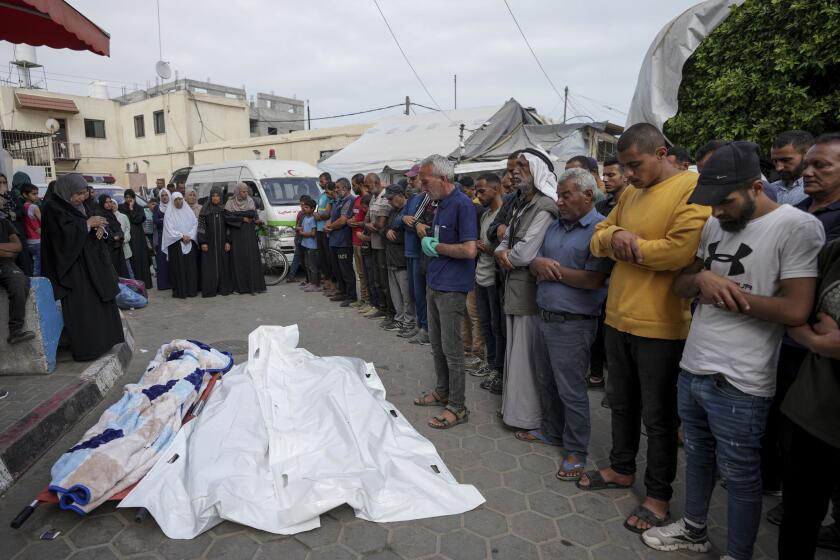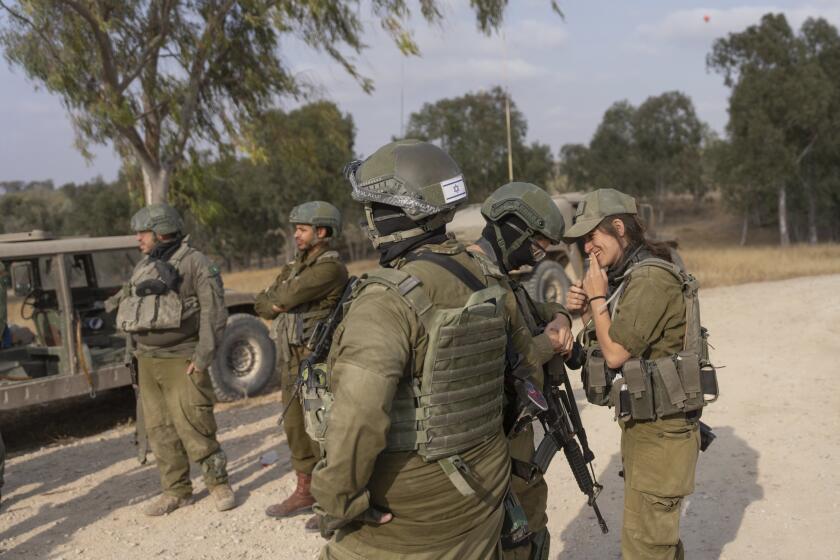He’s Ministering to Needs Far Beyond the Spiritual : Missionary: Santa Ana priest Martin Ritsi hopes to ease suffering in brutally impoverished Balkan nation.
In this time-stood-still land, where oxen still power many plows and donkey carts jostle with automobiles on the pitted roadways, progress is measured in tiny steps.
For blacksmith Tomorr Halili and this impoverished mountain community, it is the newly opened forge where Halili uses a primitive furnace, a sledgehammer, an anvil and other simple tools to repair his neighbors’ farm equipment.
For schoolteacher Apostol Binjaku, who lives in the nearby village of Gjinar, it is the water that recently began to flow into a shallow wooden trough outside his home, a current that brings with it a flood of hope and change. No longer must the women of Binjaku’s family and 13 neighboring households make daily treks for water to a spring in the hills more than a mile from their village.
And for Father Martin Ritsi, the American Orthodox priest who has been toiling in this struggling Balkan nation for nearly three years, it is the satisfaction that his efforts and those of his church have made these steps possible.
While Ritsi’s main mission is to feed the spiritually hungry in a land where religion was banned for 23 years, the Orange County priest is also trying to help his needy flock with an array of relief and development projects.
“You can’t preach to an empty stomach,” says Ritsi, 36, discussing the philosophy behind the ambitious program sponsored by the Albanian Orthodox church. “We feel that we have to try to help the whole person.”
Known as Diaconia Agapes , the Service of Love, the 2-year-old program is aimed both at assisting individuals and helping Albania’s weak, agrarian economy recover from nearly five decades of harsh Communist rule and the chaos that followed its fall in 1992.
With funding from the World Council of Churches, a Geneva-based ecumenical group, and several European and American church agencies, Ritsi in 1993 began his first program, which offered basic food aid to a number of Albania’s poorest villages.
Since then, the church has opened a badly needed medical clinic and a children’s nursery in the capital, Tirana, and begun a pilot program that provides villagers in a hard-hit region of central Albania with low-interest loans for approved projects.
Among those funded so far are plans to pipe drinking water to remote villages such as Gjinar; tractors, threshers and other equipment for farmers; and a variety of small business start-ups, including the blacksmith, a dentist, a cheese factory and a vegetable-processing enterprise.
“There is so much to be done here,” says the priest, who moved to Albania from Santa Ana with his wife and two children in August, 1992. “The potential, and the needs, are so great.”
More than three years after the election of a democratic government raised hopes of freedom and prosperity for Albania’s long-suffering people, this nation remains the poorest in Europe.
The average Albanian worker earns about $50 a month. Water and electricity services are unpredictable even in the capital; in the villages, they are often nonexistent. Fewer than half the country’s 3.3 million people live in homes with indoor plumbing. Far fewer have telephones.
The nation’s medical care, transportation and communications systems remain stuck in a kind of time warp, the legacy of years of isolation under former Communist dictator Enver Hoxha. Medical and telephone equipment, where it exists, is often woefully out of date and in disrepair. Narrow, rutted country roads pass for a national highway system.
When communism fell, thousands of Albanians voted with their feet, walking over the mountains and slipping illegally into Greece or setting sail, often in overloaded boats, across the narrow waterway that separates Albania from Italy. More than 200,000 Albanians are believed to be in Greece, with an estimated 40,000 in Italy.
Those left behind, now free to buy televisions and tune in to once-forbidden foreign broadcasts, have become only too aware of how far they lag behind their European neighbors. Their jokes are rich with self-deprecating, painful humor, tales that often center on the mythical misadventures of Albanians on their first trips abroad and their inability to cope with modern conveniences such as elevators or flush toilets.
“Five years ago, we used to sing songs about how happy we were,” says Alma Hasanpapa, 17, a high school senior in the northern town of Bajram Curri. “Before we had television, we didn’t know that we are poor. Now we know this very well.”
In the grinding poverty of Gjinar, population 960, one of six mountain villages where Ritsi’s development program was launched last year, there is little to laugh about.
Farmers say they must struggle simply to feed their families. In the land reform that followed communism’s fall, Albanian farmers were given an average of 2 1/2 acres each. But the plots often lie on steep hillsides or are too small or rocky to produce enough food for a large family.
“Our conditions are very difficult here,” said Vogjel Muca, 32, a man with tired blue eyes who teaches English at a middle school in Gjinar. “We do everything for ourselves, almost like in feudal times. We sow the wheat with very primitive tools, with oxen and wooden plows. We thresh with horses. Then we must go to the mill to grind [the grain].”
If people in outlying villages are injured or become ill, they are carried to the doctor in Gjinar on horseback, Muca said. “We need much help.”
Ritsi’s low-interest credit program, which so far has brought two tractors and three water projects to Gjinar, grew out of the desire of Albanian Orthodox Church leaders to work with other Christian groups, the priest said.
Much of the program’s funding--$138,000 for the first year, $300,000 for the second--comes through the World Council of Churches. The ecumenical organization channels money to the Orthodox program from a variety of church agencies in Switzerland, Germany, Denmark, the United States and elsewhere.
Another motivation, Ritsi said, was to help this nation, isolated for most of the last half-century, develop ties with other countries.
Church leaders also hope the program will build a new sense of cooperation among Albanian villagers, replacing the forced allegiances that existed under the Communist system.
Early on a Saturday in April, the lanky, bearded priest sat near the front of a small bus winding its way up a narrow mountain road into Shpatj, a region of small, poor villages in the mountains southeast of the industrial city of Elbasan.
Also on the bus were Ritsi’s family--his wife, Renee, son, Stephanos, 9, and daughter, Nicole, 8--and a group of British church officials who wanted to see the Orthodox church’s rural development projects.
Turned around in his seat, faded blue jeans peeking from under his black robes, Ritsi acted as tour guide. Sipping coffee, he pointed out the sights, explaining the origin of his projects to the four-member group from the Council of Churches of Britain and Ireland. The visit, all agreed, was aimed at sparking the church leaders’ interest and, perhaps, gaining their financial help.
Later that day, the visitors would make their way back to Tirana and other meetings with church officials. But Ritsi and his family stayed for two nights, using a four-wheel-drive vehicle to reach even more remote communities, where they inspected other projects and held a rare church service, chatting easily with villagers in the Albanian they have learned since their arrival.
At night, staying in homes with no running water, the family feasted on roasted lamb and fresh yogurt, olives and homemade bread, sharing the hospitality of villagers eager to thank the man who has brought them renewed hope.
“What we want to do is to give the people the seeds for progress, to empower them, really, and encourage them to work together,” Ritsi told the British church officials.
For these first projects, the priest said, the church selected those that involved agriculture, health or education, deciding those were the most pressing needs of the three clusters of villages chosen to participate in the Shpatj region.
Loan recipients are not required to be Orthodox Christians, but the area chosen, one of the country’s most destitute, is traditionally Orthodox. The church’s contacts in the region have helped the program get off the ground, Ritsi said, with priests from the area easing the way with village leaders and other local government officials.
Villagers chosen to participate “can be faithful [Orthodox Christians], or Muslim or atheist,” the priest said. “We want to help everyone.”
To launch the program, Orthodox church officials held a series of community meetings, asking residents to outline their most pressing needs. Most villagers were skeptical at first, but a few stepped forward to say they needed clean water; their homes were far from the source in the hills.
Several groups of a dozen or more families were allowed to borrow an average of $3,000 to $4,000 for each water project, at 2.5% interest. Each family was made responsible for digging specific sections of the channel between the spring and their cluster of homes.
“We provide the tubing and the funding and the villagers do the work themselves,” Ritsi said. “They look after it and protect it and if it breaks, they repair it. We want them to feel ownership of their projects.”
Working on a still-uncompleted water project in the lush green hills above Gjinar, Alex Dedja, 52, raised a pickax high above his head, then sank it deep into the reddish-brown earth, extending the 18-inch-deep channel at his feet a little farther with each blow.
Dedja took a break, leaning on his pickax with one hand and wiping his forehead with the other. Fetching water from the hills has traditionally been the work of Albanian women, he explained. Sometimes, depending on the weather and the needs of the household, he said, the women are obliged to go to the spring several times a day, carrying the water home in large plastic jugs.
“If your wife is not strong, you get a new one,” the man said, displaying a mostly toothless grin. “There is no life without water.”
The water project that includes Dedja’s family will be completed in the next few weeks, bringing water to his home and 15 others, and sparing his wife her backbreaking task. Another construction effort, for the group headed by teacher Apostol Binjaku, is already finished, and several more are in progress.
There are other successes, Ritsi said.
In Burisht, Tomorr Halili’s forge, which was opened with a loan of $500 from the church, serves a steady stream of customers in need of repairs for their farm equipment. Down the road, Mark Sinani, 42, who borrowed $1,000 from the church program, watches over his 200 newly planted plum trees.
And in the nearby village of Zavalina, Kujtim Sinani, a relative of the plum farmer and a recent graduate of Tirana University’s school of dentistry, proudly displays the used dental chair and other equipment he purchased with a loan of $1,600. Sinani, 24, hopes to borrow more to buy a drill, he said, but for now, so few of his patients have ever had dental care that their troublesome teeth must usually be pulled, not filled.
Church officials say the villagers’ early skepticism about the program vanished with the first deliveries of equipment. Nowadays, church leaders are buried under more proposals than they can handle, some of which fall well outside the church’s areas of focus.
“We even had someone ask us if we could give money to start a band,” said Artan Kosti, 36, Ritsi’s invariably good-natured assistant. “They wanted to buy instruments, different things, to play at weddings. We had to say no.” But so far, 14 other proposals have been approved.
In Tirana, meanwhile, Ritsi’s wife has used her training as an emergency medical technician to help start a clinic in a mostly Muslim area of the capital. With two doctors on staff, the newly opened clinic, located in a renovated house, offers its patients medical care and prescriptions at no cost.
Renee Ritsi said she began work on the project soon after she arrived in Albania in 1992, when she visited Tirana’s main hospital and was shocked by the conditions. She watched as a doctor tried to extract glass from a man’s face, using no anesthesia and without sterilizing his equipment.
“There were no sheets on the beds, no glass in the windows, and maybe two or three medicines in the entire hospital,” she said. “I realized I had a little knowledge and wanted to try to help.”
Renee Ritsi now volunteers at the clinic several days a week, assisting the doctors or dispensing medication from a makeshift pharmacy upstairs. Eventually, she said, she hopes to bring foreign-trained doctors to work alongside the Albanians and teach them new medical techniques.
Her husband also dreams of expanding his projects in Albania, where he hopes to work for another five years. Next year, the church will begin working in the south, near the town of Korca, he said. And each year thereafter, if all goes well and funding is available, they will add another region.
“There are so many needs and we are so few,” Ritsi said. “But when we can give people the tools to help themselves, we can really make a difference in their lives.”
More to Read
Start your day right
Sign up for Essential California for news, features and recommendations from the L.A. Times and beyond in your inbox six days a week.
You may occasionally receive promotional content from the Los Angeles Times.






